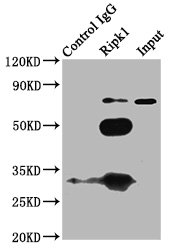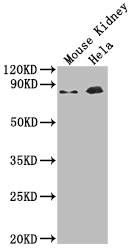
Immunoprecipitating Ripk1 in K562 whole cell lysate Lane 1: Rabbit control IgG (1?g) instead of CSB-PA720181LA01MO in K562 whole cell lysate. For western blotting, a HRP-conjugated Protein G antibody was used as the secondary antibody (1/2000) Lane 2: CSB-PA720181LA01MO (6?g) + K562 whole cell lysate (500?g) Lane 3: K562 whole cell lysate (10?g)
Ripk1 Antibody

CSB-PA720181LA01MO
ApplicationsImmunoPrecipitation, ELISA
Product group Antibodies
ReactivityHuman
TargetRipk1
Overview
- SupplierCusabio
- Product NameRipk1 Antibody
- Delivery Days Customer20
- ApplicationsImmunoPrecipitation, ELISA
- CertificationResearch Use Only
- ClonalityPolyclonal
- ConjugateUnconjugated
- FormulationLiquid
- Gene ID19766
- Target nameRipk1
- Target descriptionreceptor (TNFRSF)-interacting serine-threonine kinase 1
- Target synonymscell death protein RIP; D330015H01Rik; R; receptor-interacting protein 1; receptor-interacting serine/threonine-protein kinase 1; Rinp; RIP; Rip1; RIP-1; serine/threonine-protein kinase RIP
- HostRabbit
- IsotypeIgG
- Protein IDQ60855
- Protein NameReceptor-interacting serine/threonine-protein kinase 1
- Scientific DescriptionSerine-threonine kinase which transduces inflammatory and cell-death signals (programmed necrosis) following death receptors ligation, activation of pathogen recognition receptors (PRRs), and DNA damage. Upon activation of TNFR1 by the TNF-alpha family cytokines, TRADD and TRAF2 are recruited to the receptor. Phosphorylates DAB2IP at \\\Ser-728\\\ in a TNF-alpha-dependent manner, and thereby activates the MAP3K5-JNK apoptotic cascade. Ubiquitination by TRAF2 via \\\Lys-63\\\-link chains acts as a critical enhancer of communication with downstream signal transducers in the mitogen-activated protein kinase pathway and the NF-kappa-B pathway, which in turn mediate downstream events including the activation of genes encoding inflammatory molecules. Polyubiquitinated protein binds to IKBKG/NEMO, the regulatory subunit of the IKK complex, a critical event for NF-kappa-B activation. Interaction with other cellular RHIM-containing adapters initiates gene activation and cell death. RIPK1 and RIPK3 association, in particular, forms a necrosis-inducing complex (By similarity). Interacts with ARHGEF2 (By similarity).
- ReactivityHuman
- Storage Instruction-20°C or -80°C
- UNSPSC12352203

